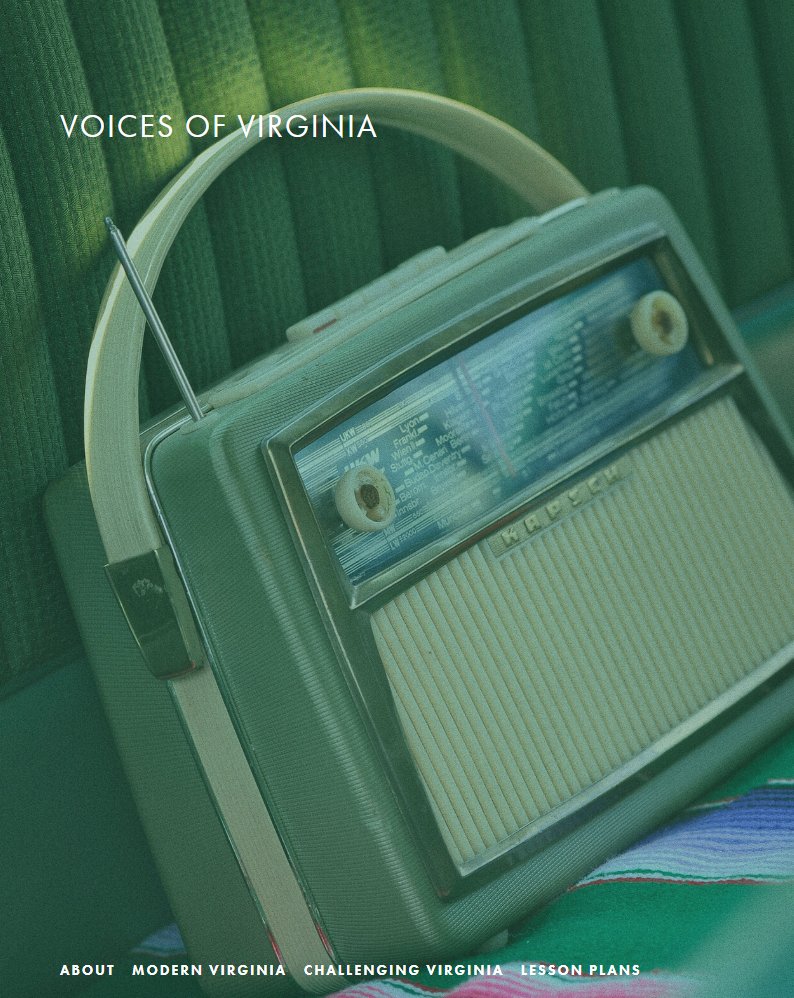It is fascinating how oral history has a way of describing a social, political, or environmental situation by putting the listener right there in the middle of the action. An interviewee has nothing to lose or gain by recalling events as they saw them, but a listener can get tremendous insight, detail, and understanding by simply… listening. While oral historians often strive to interview people who are at the top-rungs of organizations, governments, or movements, they also find a tremendous source of valuable information, context, and detail in the stories of everyday people. A new project from faculty and the University Libraries at Virginia Tech helps illustrate this.
About ten months ago, SCRC was approached by Dr. Jessica Taylor, a history professor at Virginia Tech. Dr. Taylor asked us to participate in a project to create an online open-access primary source “reader” made up of oral histories, This resource, Voices of Virginia would target high school and college US History survey classes in Virginia and feature audio segments from recorded interviews of individuals from across the Commonwealth. Holding several oral history collections, as well as having an oral history program, we were pleased to be part of this endeavor and to facilitate access to a segment from an interview in our Northern Virginia Oral History Project (NVOHP) collection.
William West, an African American and long-time resident of Vienna, Virginia, participated in several NVOHP interviews during the early 1970s. In these interviews Mr. West shared his nearly-photographic memories of experiences he had in Northern Virginia during much of the 20th century and recalled stories told to him by his parents and other relatives. The segment selected for inclusion in Virginia Voices is a six-and-one-half-minute excerpt from a 1974 interview with William West, during which he retells stories his father told him when he was younger. One of the stories is about a slave who used a horse to escape his Fairfax-area master, just before he was to be sold to a plantation owner in the Deep South.
As mentioned in the site’s description, this resource pulls together oral histories from across decades and archives in an all-audio source companion for Virginia’s high school and college students. The complete “album” contains seventy short oral histories from eyewitnesses to key moments in American history from the Civil War to the present. The excerpts are downloadable, accessible by smartphone, and accompanied by a transcript. By telling the larger national story with narratives from across the Commonwealth, Voices of Virginia grounds students in how history guides and is guided by everyday people. Just a brief listen will illustrate how this project points up the value of oral history.

Detail from the the user interface for the Voices of Virginia site. Users access the segments via the familiar SoundCloud interface.
As previously mentioned, the William West interview is part of the Northern Virginia Oral History Project collection. The collection is comprised of recorded oral history interviews of Northern Virginia residents conducted between 1962 and 1983. The interviews document community and family life, and careers in the Northern Virginia area, as well as changes in the region during the 20th century. Other topics include agriculture, development, education, health, politics, transportation, and religion. The collection contains 201 taped interviews of Northern Virginia residents. Most of the recordings have accompanying transcripts or abstracts.
Follow SCRC on Social Media and look out for future posts in our Travel Series on our Facebook, Instagram, and Twitter accounts. To search the collections held at Special Collections Research Center, go to our website and browse the finding aids by subject or title. You may also e-mail us at speccoll@gmu.edu or call 703-993-2220 if you would like to schedule an appointment, request materials, or if you have questions. Appointments are not necessary to request and view collections.


